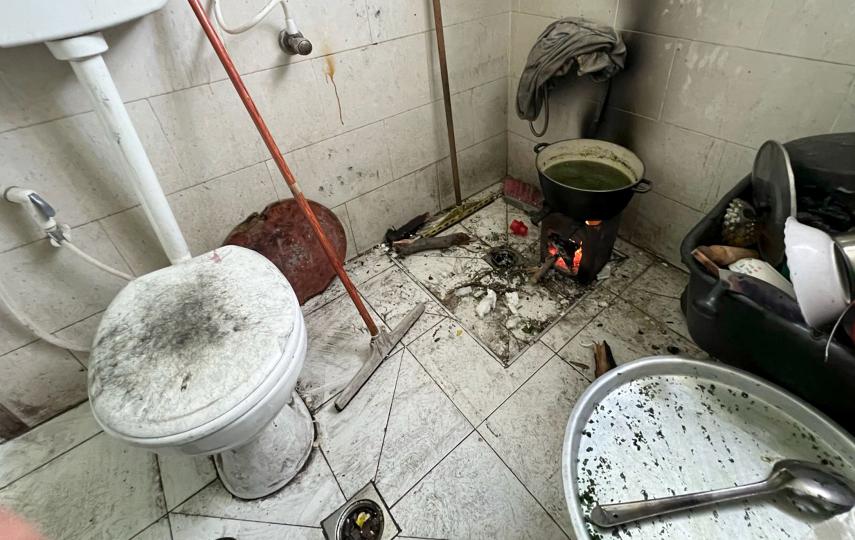HARARE
The spread of the fast growing water hyacinth weed in Harare's Lake Chivero is threatening the capital city's main water supply.
The floating weed, one metre tall in places, covers 40 percent of the lake and is soaking up oxygen and sunlight, killing fish and reducing both the quality and volume of water in the lake.
Water hyacinth has become a major pest in waterways around the world. Its rampant growth can destroy native habitats, and high rates of transpiration through the weed's leaves during summer can cause up to four times the loss of water from normal water surface evaporation.
Environmentalists in Harare blame the spread of the weed on the discharge of effluent, particularly raw sewage, into lake Chivero. They have called for an integrated approach to tackle the problem.
The Environmental Management Act exists to provide strict guidelines on policy implementation and ensure that stakeholders carry out their mandate with respect to pollution control and preservation of the environment. Pollution beyond accepted limits carries a five-year imprisonment penalty.
However, the provisions of the act, passed in March 2003, are still to be effectively used. As a result, progress on controlling the discharge of effluent into the lake and efforts to get rid of the hyacinth have so far been unsuccessful.
The department of National Parks and Wildlife has been trying to control the weed by using herbicides and removing it manually and with harvesting machines. However, these methods require regular follow-up operations to prevent re-infestation.
Progress was hampered because "the effluent has the effect of putting fertiliser onto something you are trying to get rid of", National Parks official Edward Mbewe told IRIN.
"The effluent impact is [evident] by the way we are losing fish. There is now a lack of oxygen for them," he added.
The Zimbabwe National Water Authority (ZINWA), responsible for national water pollution control, blames the Harare city council and is preparing to force the council to pay for clean-up efforts.
The water hyacinth is concentrated on the eastern side of the lake, around the discharge points for the Harare city council's sewage disposal works, Shamiso Mtisi, a lawyer with the Zimbabwe Environmental Law Association (ZELA) told IRIN. Mtisi added that ZINWA lacked the resources and manpower to carry out effective monitoring on the ground.
According to the "polluter pays principle" of the Water Act, ZINWA can issue permits at a cost to bodies wishing to discharge pollutants into water sources after industrial use, but the polluted water must be recycled and the pollutants reduced to harmless levels before the water is released into waterways.
ZINWA has stripped the council of its permit, is accusing it of discharging insufficiently treated effluent into the lake and of doing so without a discharge permit.
A ZINWA official said court action could force the council to release funds for the upgrading of its sewage works. The Water Act also allows ZINWA to pay for the clean up of pollution and recoup costs from the offender.
City council spokesman Leslie Gwindi told IRIN the council was carrying out its mandate with respect to pollution control. He said there had been equipment failure at two sewage works and the council was "working on them" and had been "on top of the situation even before ZINWA's involvement".
Gwindi denied that council effluent was chiefly responsible for the growth of the hyacinth in Lake Chivero. "The weed is feeding on a lot of things. It is simply difficult to destroy because of the microcosms that exist in the water," he explained.
Mtisi, the ZELA lawyer, however, said existing waste water treatment facilities were increasingly overloaded and prone to collapse because of ever-increasing volumes of waste generated by a growing urban population. The council, generally lacking in resources, has been struggling to pay for refurbishments to its water works.
Although litigation induced "a sense of fear in other would-be polluters", it was costly and time-consuming and it was unclear whether the penalties were a sufficient deterrent, he added.
Mbewe at the National Parks agency believes litigation to be a waste of resources that could be better used for pollution control. "While the law suit against the Harare council is being prepared, the effluent in Lake Chivero remains. While the court action is happening, there will be more pollution," he told IRIN.
Barney Mawire of the NGO Environment Africa said a major step in arresting the pollution in Lake Chivero would be to rehabilitate the swampy wetlands which, during rainy periods, acted as a sponge and filtered water headed for the lake. But the increasing use of the wetlands for agriculture was arresting their ability to clear the water.
This article was produced by IRIN News while it was part of the United Nations Office for the Coordination of Humanitarian Affairs. Please send queries on copyright or liability to the UN. For more information: https://shop.un.org/rights-permissions




